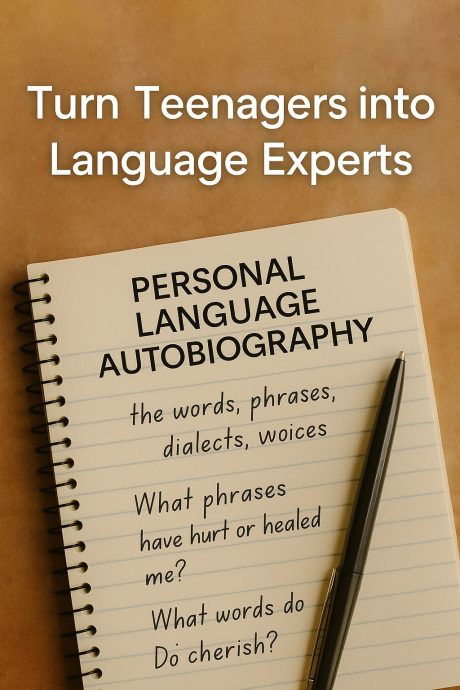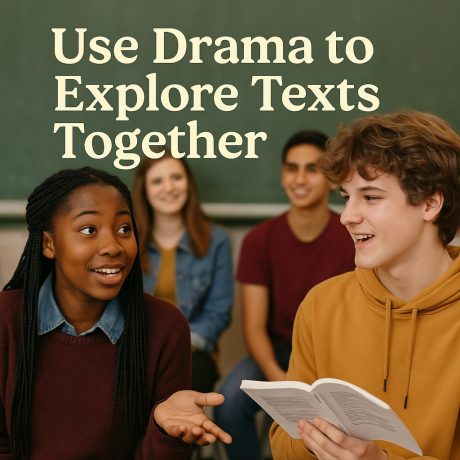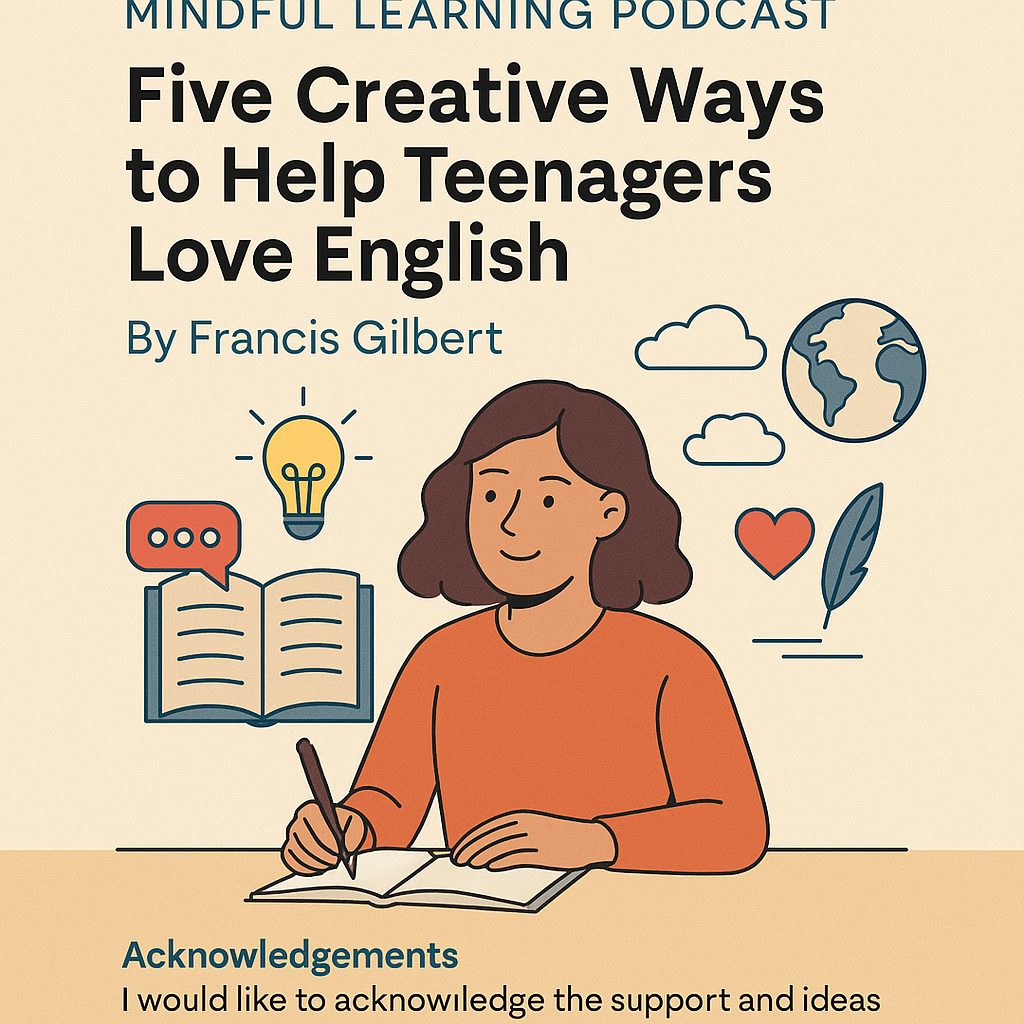📣 Are you a teacher, trainee, parent, or education student wondering how to make English more engaging and meaningful for young people?
This blog (and podcast episode of The Mindful Learning Podcast) explores five powerful ways to help teenagers connect with English—and grow as people.
📚 English for Generation Alpha: A New Purpose

How can English teaching nurture young people—not just academically, but emotionally and socially?
This is the central question in the new book Secondary English for Generation Alpha: Humane Pedagogy for Local, National and International Contexts, edited by Lorna Smith (Routledge, 2025). I’ve contributed a chapter alongside inspiring voices such as Dr Ian Cushing and Dr Sue Pinnick.
Generation Alpha—born between 2010 and 2025—are growing up in a world shaped by climate crisis, digital saturation, political polarisation, and social inequity. They need more than grammar rules and essay tips. They need English teaching that helps them make sense of who they are and what they care about.
Here are five practical, inclusive, and creative approaches—drawn from the book and my own teaching experience—that can help students love English and grow as humans.
1️⃣ Turn Teenagers into Language Experts: The Personal Language Autobiography (PLA)

In my chapter (Gilbert, 2025), I introduce the Personal Language Autobiography—a reflective writing task that helps students explore the words, dialects, voices, and phrases that have shaped their identities.
🗣️ What words have hurt you? Healed you? Inspired you?
Students become experts in their language journeys. This not only builds critical thinking and writing skills, but also deepens their emotional understanding of language’s power. It’s transformative for teachers too—writing your own PLA can reconnect you with why you became an educator.
This approach is rooted in the theory of funds of knowledge (González et al., 2005), which values students’ lived experience as a rich educational resource.
🎧 Try this: Ask students to write about a phrase their grandparents use that nobody else understands—and what it means to them.
2️⃣ Use Drama to Explore Texts Together

Sue Pinnick’s chapter shows how drama can unlock meaning in English lessons—not by analysing texts from outside, but by inhabiting them. When students act, speak, move, and improvise, they gain emotional insight and build empathy.
🎭 For example: Use role play or freeze-frames to explore a character’s motivation.
🎤 Try hot-seating students as characters from a novel or play.
This performative approach is especially powerful for disengaged or neurodiverse learners. As Cremin et al. (2006) note, drama can help students seize the moment to write—because they’ve already lived it.
3️⃣ Promote Linguistic and Racial Justice in the Classroom

In his compelling chapter, Dr Ian Cushing, expert on linguistic justice, critiques how English teaching in England often polices “correctness” in a way that disadvantages students of colour or those using regional dialects (Cushing, 2025).
We must shift from enforcing “Standard English” as the only valid form, to celebrating multilingualism, dialect diversity, and linguistic identity.
🧭 Cushing advocates for linguistic justice: teaching students that all language forms have value, power, and beauty.
✏️ Tip: Let students submit creative work in their own voice, even if it includes slang, dialect, or code-switching.
4️⃣ Use Creative Writing to Build Racial Literacy and Empathy

Editor Lorna Smith’s chapter explores a powerful project using object-based learning and creative writing to deepen teachers’ racial literacy. Using facsimile artefacts from Black British plays, teachers wrote imaginative responses to deepen their understanding of race, identity, and empathy.
This aligns with Yolanda Sealey-Ruiz’s (2021) call for a critical pedagogy that includes racial literacy: helping both teachers and students read and write the world through a lens attuned to injustice and inequality.
✍️ Creative writing isn’t just expressive—it’s a tool for radical empathy.
5️⃣ Build on Students’ Funds of Knowledge

Whether it’s a local idiom, a religious ritual, a family recipe, or a favourite meme, students bring a rich world of experience into the classroom. When teachers draw on these lived experiences, students feel seen, valued, and willing to take creative risks.
This approach is at the heart of funds of knowledge pedagogy (González et al., 2005) and underpins every chapter in the book. For Generation Alpha, shaped by global culture and hybrid identities, this isn’t a luxury—it’s essential.
📌 Tip: Ask students to bring in an object from home that tells a story—and write about it.
🔚 Final Thoughts: Let Teenagers Write Themselves into the World
Secondary English for Generation Alpha offers a humane, creative, and radical vision for English education. It reminds us that when we centre students’ lives, promote justice, and unlock creativity, we do more than teach a subject—we help young people flourish.
👣 Want to help teenagers love English?
Start by listening to them, trusting them, and giving them the space to write themselves into the world.
References
Cremin, T., Bearne, E., Dombey, H., & Topping, K. (2006). Connecting Play and Writing: Seizing the Moment to Write. UKLA.
Cushing, I. (2025) ‘Linguistic justice efforts in England’s schools’, in Smith, L. (ed.) Secondary English for Generation Alpha: Humane Pedagogy for Local, National and International Contexts. 1st edn. Abingdon: Routledge.
Gilbert, F. (2025). Four Ways Personal Language Autobiographies Can Transform the English Teaching of Generation Alpha. In L. Smith (Ed.), Secondary English for Generation Alpha: Humane Pedagogy for Local, National and International Contexts. Routledge.
González, N., Moll, L. C., & Amanti, C. (2005). Funds of Knowledge: Theorizing Practices in Households, Communities, and Classrooms. Routledge.
Sealey-Ruiz, Y. (2021). Critical Literacy and Race. In B. Comber, A. Simpson & D. L. Payne (Eds.), Developing Critical Literacy: A Guide to Advanced Thinking, Writing, and Reading (pp. 196–207). Routledge. https://www.taylorfrancis.com/chapters/edit/10.4324/9780429331435-21/critical-literacy-race-yolanda-sealey-ruiz
Smith, L. (Ed.). (2025). Secondary English for Generation Alpha: Humane Pedagogy for Local, National and International Contexts. Routledge.
📘 Read More
- Book: Secondary English for Generation Alpha: Humane Pedagogy for Local, National and International Contexts (Routledge, 2025)
- Chapters by: Francis Gilbert, Ian Cushing, Sue Pinnick, Lorna Smith and more
- Find it here: Routledge
🎧 Listen to the Podcast
This blog is also a Mindful Learning Podcast episode. Subscribe wherever you get your podcasts—and share it with a colleague, mentor, or teacher-in-training.
🗣️ Join the Conversation
📩 Have you tried PLAs or drama in your classroom?
💬 What’s your approach to linguistic or racial justice in English?
Tag me or comment below—we need these conversations now more than ever.
#MindfulLearning #EnglishTeaching #GenerationAlpha #LinguisticJustice #CreativeWriting #FrancisGilbert #EducationMatters #CriticalPedagogy #DramaInEducation


Leave a Reply